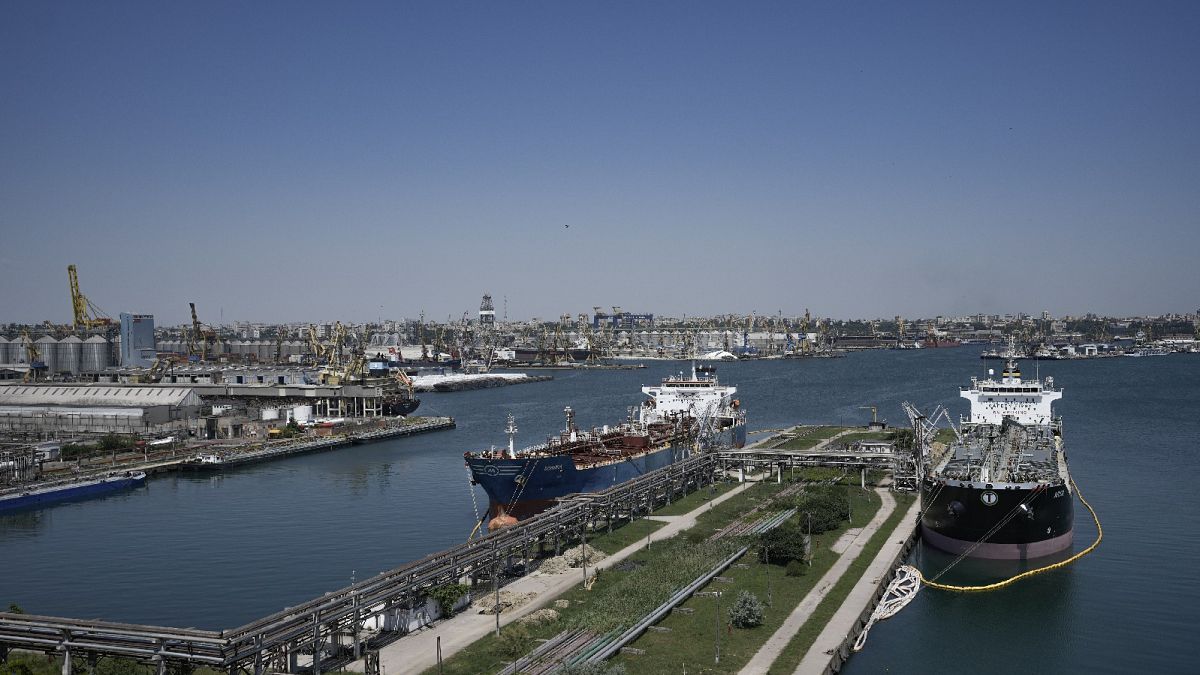Romania has embarked on a €4 billion project it hopes will make it the largest natural gas producer in the European Union but these investments risk hampering its and the bloc's goal of carbon neutrality.
With its Neptun Deep offshore gas project, Romania aims to extract approximately 100 billion cubic metres of natural gas and it is banking on funding allowed under the EU's taxonomy -- which categorised nuclear and gas as sustainable -- to build a pipeline.
"Romania is a strategic transit point and an important regional player, being able to contribute, thanks to its operational transmission infrastructure and the geostrategic position we enjoy, to a strengthened regional security," the country's Energy Minister, Sebastian Burduja, said in June during the signing of the Tuzla-Podisor gas pipeline order.
This pipeline will link Neptun Deep to the BRUA pipeline supplying gas to Hungary and Austria.
Activists have however decried the project over environmental concerns.
Climate and biodiversity impact
"This project’s greatest and most damaging impact would be its climate impact," Alin Tanase from Greenpeace Romania told Euronews.
"We expect this project to lead to fugitive methane emissions, like most projects of this nature, both at the gas probe level and at the transportation levels, as Romania has some of the oldest infrastructure in the Union. This methane is much more dangerous than CO2 - it has a higher potential to warm the climate," he added.
The CO2 emissions should also be substantial.
"BankWatch estimated that Neptun Deep would emit 18 million metric cubes on a yearly basis, nearly as much as what the entire annual Romanian electricity sector produces at the moment. This would be a very substantial emission spike," Raluca Petcu, BankWatch Romania’s Gas Campaigner, said.
Yet, "these emissions are not accounted for," according to Petcu, "because they are indirect emissions, resulting from burning the gas, not the direct construction and infrastructural use. In the impact assessment evaluation these are not mentioned at all, meaning that they are not taken into account when calculating the environmental impact."
For BankWatch this is problematic as the emissions are a direct result of the project.
Besides its significant climate impact, the Neptun Deep project poses a substantial threat to biodiversity. The documentation submitted for the project’s environmental accord highlights perturbances to fish, sea mammals, and terrestrial species as well as their habitats.
"When the documents describe a negative impact, it is always passed as temporary with claims that the habitats are expected to return to their initial state once the project is over after 20 years. It is hard to prove that this will indeed be the case," Greenpeace’s Tanase said.
The government however argue that Neptun Deep is needed to boost the country's and the EU's energy security as it would weaken dependence on Russian fossil fuels.
A spokesperson for the European Commission also defended the project and the use of EU money by telling Euronews that "the Tuzla-Podisor gas pipeline fosters the diversification of the Romanian energy mix and as such can contribute to emissions reductions."
'Russia to oppose' such projects
One area of concern, however, is Russia's reaction.
Romania hopes to supply gas to Austria and Hungary through the BRUA pipeline. As these countries rely heavily on Russian gas, the project could further strain Romania’s relations with Russia.
In 2023, Hungary raised its gas imports from Russia, while Austria's imports returned to the levels observed before Moscow launched its full-scale invasion of Ukraine.
"It is expected that Russia will oppose these natural gas projects," The Atlantic Council, a thinktank, wrote in late July, referring to all offshore initiatives by countries with access to the Black Sea access.
After Russia's illegal annexation of Crimea in 2014, Romania's exclusive economic zone (EEZ) now borders Russia's. The application of NATO protection to offshore gas facilities in the EEZ is uncertain, leaving room for Kremlin interference.
The Funding question
The EU’s Modernisation Fund - a funding programme supporting ten lower-income member states to achieve climate neutrality - has invested €85 million in the Tuzla-Podisor pipeline out of an estimated total cost of €478 million.
"Until now, Romania has been the only beneficiary member state that asked for financing for gas transmission projects," a spokesperson for the European Investment Bank (EIB) told Euronews. The EIB has a representative on the Modernisation Fund's Investment Committee, but its role within the Modernisation Fund is both limited and well-defined.
However, the EIB had already provided financing for the Tuzla-Podisor pipeline using its own funds through two loans: €50 million in 2018 and €100 million in 2019. The EIB spokesperson explained that these loan agreements "were approved and signed before the implementation of the Bank’s new Energy Lending Policy, which marked the end of the EIB’s financing of unabated fossil fuel projects." The first €50 million were nevertheless disbursed in July 2023.
The Neptun Deep extraction would undoubtedly increase the share of gas in Romania's electricity mix. In 2022, this stood at 17.6%, making it the fourth-largest source after hydropower (25%), nuclear (20%), and coal (18.5%).
However, the exact gas share increase remains unclear, depending on how much of the 8 billion cubic metres of gas extracted yearly will remain in the country.
Meanwhile, renewable energy sources, such as solar and wind, accounted for 16% in 2022.
In contrast to the Commission’s position, Nicolae Stefanuta, a Green Member of the EU Parliament, believes that "by considering gas a transitional energy, Romania is engaging in a double transition. The end costs of then switching from gas to renewables will be higher."
A view shared by Simon Dekeyrel, an analyst at the European Policy Centre, for whom "this project reinforces Romania’s and therefore the EU’s reliance on natural gas for decades ahead."
“EU funds should not, under any circumstances, be allocated to pipelines supporting the development of a new gas field in the EU, as is the case with the Tuzla-Podisor pipeline,” he said.
